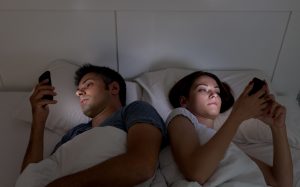
The study found that the participants used their phone on average for 38 hours during the one-month period. The quality of sleep deteriorated as the smartphone usage increased. The closer to bedtime the participants used their phones, the poorer their sleep was.
Study senior author Dr. Gregory Marcus explained, “A substantial amount of our time is spent engaging with smartphones. These may have important health effects, including influencing fundamental needs, such as our ability to acquire and maintain a good night’s sleep.”
“These data [from the new study] suggest that reducing screen-time, particularly prior to bedtime, may help enhance the duration and quality of sleep. We cannot exclude the possibility that those with difficulty sleeping — for some reason unrelated to their smartphones — spend more time on their phone as a result, rather than a cause, of their inability to sleep,” Dr. Marcus added.
Getting a good night’s rest is imperative to overall good health. Poor sleep has been linked to negative health outcomes such as obesity, cardiovascular disease, and diabetes. Therefore, a quick solution in improving health would be to avoid screen time close to sleeping hours.